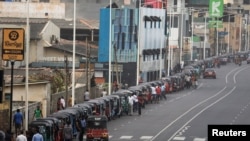A U.N. study released Thursday shows the first three months of the war in Ukraine has driven up the global cost of fuel and food, creating record inflation that has helped drive 71 million people into poverty.
Speaking during a virtual news conference in Geneva, U.N. Development Program Administrator Achim Steiner said the analysis of 159 developing countries indicated that price spikes in key commodities were already having “immediate and devastating impacts on the world’s poorest households.”
The study shows that the economic shock of Russia’s invasion of Ukraine came after 18 months of COVID-19 pandemic lockdowns, which had a slower but cumulative and strong negative impact on world economies. He said the pandemic had already pushed about 125 million people into poverty.
At the same news conference, UNDP Senior Economist George Gray Molina said as a result many countries have faced 36 months of “shock after shock after shock.”
Molina said the impact of the war has been “drastically faster,” affecting global food and energy supplies and sparking the inflationary surge.
Steiner said failure by governments to take decisive and “radical” action risks sparking widespread unrest, as the patience and ability of people to cope with the situation runs out.
He pointed to the situation in Sri Lanka, where the government is in turmoil and the nation is facing food and fuel shortages and has defaulted on its national debt for the first time in its history.
The development program study offers some financial policy recommendations to address the crisis. Steiner suggested, for example, that it might be possible for some countries to tackle runaway inflation without resorting to the “blunt instrument” of raising interest rates.
He said multilateral investment institutions, such as the International Monetary Fund (IMF) could provide more capital to allow nations to address the crisis through targeted lending and other crisis-response measures.
Some information for this report was provided by the Associated Press and Reuters.
UN: Inflation Driven By Ukraine War Draws 71 Million into Poverty
- By VOA News





